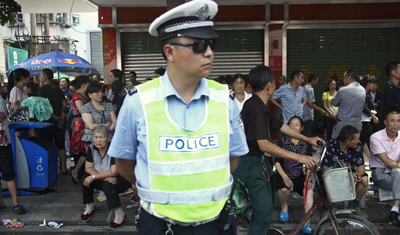Shi Junrong, Xi’an Evening News bureau chief in the city of Wei’an, ran into trouble recently after he reported on the costly brand of luxury cigarettes favored by local officials. He announced on his microblog that the paper suspended him soon after, according to the U.S. government-funded Radio Free Asia.
That might have been the end of the story if it weren’t for the public outrage that ensued in the comments section and the media. In fact, “his suspension drew even more attention than the original story,” as Chinese Communist Party mouthpiece, the China Daily, said in its coverage of the incident. The China Youth Daily published this editorial, translated by Hong Kong University’s China Media Project: “Journalists’ rights are a barometer for the rights of a society and public at large. When the rights of journalists are violated, when the rights of journalists are not protected, there is little hope that the rights of the people will be ensured, that their rights will not be violated.”
If you’re surprised to read such a stirring defense of media freedom in the mainstream Chinese press, you shouldn’t be. In 2010, CPJ took a look at the growing defense of journalists’ rights in China and found that these statements were neither uncommon nor censored. Nor are they incompatible with the government’s position on investigative journalism, or “supervision by public opinion.” On the contrary, this pro-rights mentality is encouraged by official statements. Take the Shi Junrong case: General Administration of Press and Publication official Nong Tao was quoted in news accounts defending Shi’s report.
Journalists take advantage of this apparent permissiveness to protest against “silencing,” CPJ found, in ways that indicate their dissatisfaction with the broader, government-run industry of information control–but only obliquely. Singling out officials who try and keep their wasteful smoking habits from scrutiny might be OK, but accusing the Communist Party of imprisoning journalists remains off limits. What’s concerning is that sanctioned protests, while they are limited in this way, create the appearance of official accountability, but ultimately lack substance. As we said in 2010, “the creation of narrow, state-sanctioned press rights benefits the Chinese government … by providing a limited outlet for journalists’ concerns while diverting criticism and advocacy away from its own policies of information control.”
The strategy of diverting criticism is perfectly illustrated by the week’s other big media story in China: environmental protests in Shifang, western China, over a metal plant that locals feared would cause pollution. Police targeted protesters documenting the unrest, and censors erased coverage from social media, yet the sometimes-violent clashes were still the most searched topic on Weibo, Sina’s microblog service, on Tuesday, according to The New York Times. When the local government cancelled building at the plant which had sparked the riots and released some detained protesters, the international press almost universally hailed it as a victory for the people.
Officials kowtowing to citizens’ demands to quell protests has become routine in China, but the follow-through has not. Officials in Dalian said a chemical plant would be closed after protesters took to the streets in August 2011, but it resumed production in January, according to CNN. Authorities in Xiamen acceded to demonstrators’ demands to move a chemical plant in 2007, but publicly pursued the protest organizers, according to law professor Benjamin Van Rooij from the Netherlands.
Journalists defending Shi Junrong, and middle-class locals defending their hometown in Shifang, may be articulating their rights and demanding more from China’s leaders. But they are also perpetuating a cycle of protests that authorities can diffuse without the need for reform or redress for serious injustice. That is not a victory.
